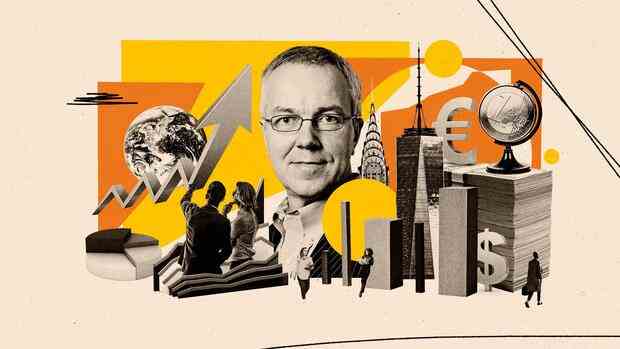Handelsblatt International correspondent Torsten Riecke analyzes interesting data and trends from all over the world in his weekly column. You can reach him at [email protected]
(Photo: Klawe Rzeczy)
London A strong narrative, i.e. a convincing explanation of reality, is the key to interpretation sovereignty. This is true in politics as well as in economics. But what if the dominant narrative reflects the power of opinion rather than economic reality?
The current inflation debate offers some indications that the usual explanations no longer adequately reflect economic reality. For example, high corporate profit margins could play a greater role in persistently high inflation than central bankers have so far recognized.
The common explanation for the current inflation is this: high energy and production costs have pushed prices up. The trade unions react to the resulting real wage losses with high wage demands, which evokes the danger of a wage-price spiral. The central banks must counter the danger with resolute interest rate cuts.
They’ve been fighting the specter of inflation more or less successfully since the 1970s, and double-digit pay deals like Deutsche Post’s now seems to support that narrative.
However, there are now indications, particularly in the USA, but also in Great Britain and the euro zone, that the pricing power of companies is a key factor in the fact that inflation rates are only falling very slowly, despite significantly falling energy prices.
>> Read also: Why there will be no wage-price spiral – a comment
University of Massachusetts Amherst economist Isabella M. Weber and her colleague Evan Wasner have not only found that US corporate profit margins have risen to their highest level since World War II. Their calculations also show a strong correlation between high corporate profits and the sharp rise in prices after the pandemic.
High inflation rates and high profit margins are correlated
Paul Donovan, chief economist at UBS Wealth Management, has looked in particular at the hotel industry in the USA and comes to a similar conclusion. He now sees the same forces at work in Europe: “It is clear that earnings growth has played a larger role in the history of European inflation over the past six months.” The ECB has failed to address this development.
“Profit inflation” is said to have been a topic at a closed meeting of the ECB in Inari, Finland at the end of February. ECB President Christine Lagarde said on Monday in the European Parliament: “In our monetary policy statement, we stated that company profit margins, if they have not increased, have at least been maintained.” The central bank depends on it, definitely to prevent so-called “second-round effects”.
However, ECB chief economist Philip Lane downplays corporate pricing power: “European companies know that if they raise prices too much, they will lose market share.”
However, it is disputed whether the assumption contained therein of functioning competition corresponds to economic reality. A study by the Ifo Institute has just shown that companies in retail, hospitality and transport as well as in the construction industry used the situation last year “to increase their profits significantly”. A study by the British trade union Unite of 350 listed companies on the island came to a similar conclusion.
Currency watchdogs need the help of cartel watchdogs
According to the Viennese economist Philip Heimberger, there is not yet enough data to be able to make a clear judgment about the importance of earnings inflation for general price developments. However, since the correct explanation of inflation is crucial for the success of monetary policy, the central banks must be careful that their cherished inflation narrative from the 1970s does not ignore more recent price phenomena.
If it turns out that corporate pricing power is partly responsible for the fact that inflation remains so stubborn, further interest rate hikes would hardly be able to slow the rise in prices. What would then be required would not be the money watchdogs, but rather the cartel watchdogs with a stricter competition policy.
More than a year ago, US President Joe Biden had instructed his Federal Trade Commission (FTC) competition watchdog to take a close look at alleged anti-competitive behavior in the US energy sector. Lagarde agreed in principle this week: “I think that the antitrust authorities and the competition commissions should pay special attention here,” said the head of the ECB, referring to the pricing power of companies in front of the EU parliamentarians.
More: The new reality – banking crisis could push the Fed off its interest rate course.

